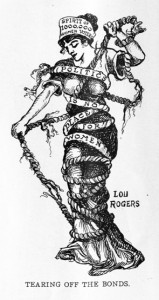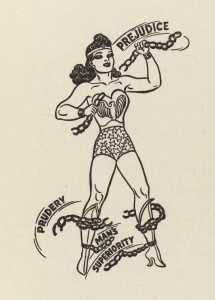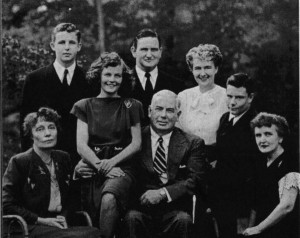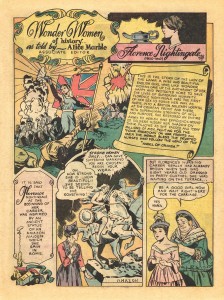A
Genre: Comic, Nonfiction
The Secret History of Wonder Woman is an absolutely fascinating non-fiction book about the man who created Wonder Woman and the many women who inspired him and who, in many cases, directly contributed to Wonder Woman in concept, story, and design. It’s also a history of feminism from the suffragette movement into the 1950’s (it touches briefly on the 1960’s and 70’s but is primarily devoted to early feminism).
I dragged my feet a bit about reading this book because I had just finished another book about the history of Wonder Woman. Tim Hanley’s excellent Wonder Woman Unbound was a pretty extensive overview of Wonder Woman from the first comics to the present day, and I was afraid that The Secret History would be redundant. It isn’t, because instead of trying to track Wonder Woman across her entire existence, the author focuses on Wonder Woman’s origins, which means we get to hear tons of great stuff about the suffragette movement, the battle for birth control, bohemian attitudes towards sex in the Roaring 20’s (including Marston’s complicated ideas about bondage), and women’s struggles to balance motherhood with careers. There’s also history about the lie detector test that Marston invented, and the motion picture industry that he was briefly a part of. You don’t have to be interested in comics to find this book compelling.


William Marston, who was also the creator of the lie detector test, created the character of Wonder Woman and wrote Wonder Woman comics under the name Charles Moulton.
William was always interested in feminism. The suffragette movement fascinated William Marston, who was attending college during the height of the movement. He met a girl named Sadie Holloway when they were both in eighth grade. Later she said of him, “We did our biggest fighting at around 14 so that by the time we hit college we were going pretty well as a team.” She was an ardent feminist who married Marston while they were both in law school. A few years later Marston was working as a psychology professor when he fell in love with one of his students, Olive Byrne.
Olive had a childhood that was steeped in themes of feminism and also in abandonment. When she was a born, the midwife was her mother’s sister, Margaret Sanger, the famous birth control advocate. When her father came home, he threw the newborn baby into a snow bank and Margaret had to rush outside and rescue her. When Olive was three and her brother was two, her mother left her father. She left the children with her parents, and she ended up working with Margaret to improve women’s’ access to birth control. When the grandparents died, Olive and her brother went to a series of orphanages and boarding schools.
When Olive met Marston, she wanted a family. Sadie was not initially happy about inviting a third party into her marriage, but she saw a way for her to have a career and still have children. So the three of them became a family (with a frequent fourth, Marjorie Wilkes Huntley, who came and went). Each woman had two children. They all lived together, with Olive as homemaker, Sadie as breadwinner, and William as a partial breadwinner (he had a varied career). Olive insisted that her children never know that William was their father – the nature of the family relationship was a secret from almost everyone, even the children. While the book makes it clear that this arrangement was not easy and that the family had plenty of dysfunction, the family appears to have been close-knit and loving, and Olive and Sadie stayed together through the duration of their lives, long past William’s death.

Marston created Wonder Woman with a specific feminist aim. He wanted girls to see themselves in comics as strong and nurturing. He also wanted boys to value both of these traits, and to look up to women:
It’s smart to be strong. It’s big to be generous. But it’s sissified, according to strictly masculine rules, to be tender, loving, affectionate, and alluring. “Aw, that’s girl’s stuff!” snorts our young comics reader. “Who wants to be a girl?” And that’s the point; not even girls want to be girls so long as our feminine archetype lacks force, strength, power…The obvious remedy is to create a feminine character with all the strength of Superman plus all the allure of a good and beautiful woman.”
I found this book to be an amazing page-turner, full of fascinating detail. Although I like reading non-fiction, I usually read it much more slowly than I read fiction. The fact that I read this rather large book in about two days is a testament to how entertaining and interesting it is. The book talks about women’s struggles in universities and workplaces, women trying to balance family and work, and women in comics (as characters and as writers and artists). It briefly addresses the racism in Wonder Woman, pointing out that it was no better or worse than it’s contemporaries (which is to say, awful). Marston wrote several other pieces condemning racial prejudice and anti-Semitism, and it’s a terrible shame that these attitudes did not make in into the pages of Wonder Woman. An exception is that several women of color were featured in the “Wonder Women of History” pages. These were extra pages that profiled real historic figures including Sacagawea, Sojourner Truth, and Madam Chiang Kai-shek.

Another thing I enjoyed about the book is that it has plenty of pictures. There are several black and white excerpts from the comics sprinkled throughout the book, and there’s a large color section. There are photos of most of the major players in the book, photos from current events of the time, and several sample Wonder Woman pages.
I realize that in this review I’m summarizing more than reviewing, but that’s because I found the facts related in the book to be so irresistibly interesting. The book is well organized and there is a huge footnote section for the more academically inclined among us.
After Marston died, Sadie tried to take over the writing of the comics but DC dismissed her out of hand. After WWII the comics industry took a huge blow when, following controversy caused by Dr. Fredric Wertham’s critique of comics, The Seduction of the Innocent, they adopted a new code of conduct. Among other things, the code stated that “The treatment of love-romance stories shall emphasize the value of home and the sanctity of marriage.” Wonder Woman’s storylines changed, and the Wonder Women of History section was replaced by a section about wedding trivia called “Marriage a la Mode.”
Despite her rocky career, Wonder Woman has never gone out of print. If you want to check out how Wonder Woman is doing in the comics these days, she’s in three runs right now: Superman/Wonder Woman (which I haven’t read), DC’s New 52 Wonder Woman, and Sensation Comics Wonder Woman. I have not read the New 52 Wonder Woman so I have no personal assessment of it. However, the fact that artist David Finch has said, among other things, that he doesn’t want to call Wonder Woman a feminist, makes me really leery about this series. If anyone has read it, please let us know what you think.
On a brighter note, I LOVE the Sensation comics run. It’s an anthology format, so there are lots of different stories and styles of writing and art, all of which proudly cast Wonder Woman in a feminist light. It’s a digital first series and the first volume is available in print.
This book is available from:
As an Amazon Associate we earn from qualifying purchases.
We also may use affiliate links in our posts, as well. Thanks!




I’m really glad to hear that you liked this one, Carrie. My husband gifted it to me along with three volumes of Marston’s original run. I’ll dive in this weekend!
I read the first 6 issues of New 52 Wonder Woman and was not a fan. Her origin story was tweaked in such a way that I thought it removed much of the power Marston started her with. There was too much violence (this is coming from a comics reader) and no joy. However, I am more of a Marvel reader (Captain Marvel forever!) so readers who are fans of DC might feel differently about this run.
I just finished reading this too, and when I first picked it up I thought it was the book you had previously reviewed. I enjoyed the look into Marston’s family life.
PBS did a great documentary on the impact of superheroines in culture, particularly for girls. It’s no longer streaming on PBS.org, but here it is on youtube. They interview Kathleen Hanna! 😀
Jill Lepore gave a great talk about this book at Harvard’s Radcliffe Institute, where she does a lot of her research. You can view it here: http://www.radcliffe.harvard.edu/video/jill-lepore-how-wonder-woman-got-harvard
I went to a talk by Jill Lepore last month, and she’s amazing. I also highly recommend this book and she draws lines from the girls who read Wonder Woman in the 40s becoming the 2nd Wave feminists of the 60s and 70s.
I read the Hanley book (and have since thought, given the subject matter, it was kind of ironic and sad that the Wonder Woman book written by a man was first out of the gate) and wasn’t sure I would want to read a second. Never been much of a comics reader, and my experience of WW was through the TV show. Glad to hear this one seems more focused, and I hope it gets a lot of readers.
I’m almost done reading this and like you, Carrie, love not only the origins of Wonder Woman, but how Marston developed such a character in that time. He was also a bit eccentric, to say the least 🙂
Would definitely recommend Wonder Woman: Spirit of Truth part of a 2001 mini series written by Paul Dine art by the incomparable Alex Ross for an interesting take on Diana. No bondage, but still, I think Marston would approve.
As a longtime Wonder Woman fan, I have so many thoughts and feelings about her portrayal and history. The new 52 version is *awful*, destroying everything positive about the character. A lot of people really like the Azzarello-Chiang run (and I do love Chiang’s artwork to itty bits), but I can’t stomach the changes to her origin. The Sensation digital series is quite enjoyable, but they’re short stories in different art styles, so you never get the luxury of a great run. If you’re a fan of the tv series, a new digital series Wonder Woman ’77 just started by Marc Andreyko and it reads just like those old episodes.
If you’re interested at all in the Marston stories in all their Golden Age wacky glory, there are several volumes of the Wonder Woman Chronicles that reprint them in order.
I’d also encourage finding Gail Simone’s recent run, starting with the Circle TP or even Greg Rucka’s version.
I was so disappointed by this book, but I’m glad other people like it – I generally love Jill Lepore’s work. I agree you don’t have to be interested in comics to enjoy this book, in fact, I bet it would help, because it’s pretty dismissive of Wonder Woman specifically and comics in general. I also didn’t get the impression that Lepore was all that impressed with Marston and his menagerie; I’m baffled why she picked the subject, particularly as she didn’t have much to add to it. Detail, yes, scope, no.
Can’t recommend Blindspot enough, however.